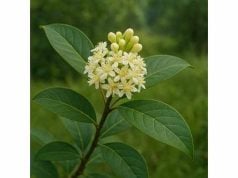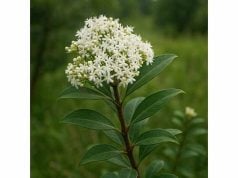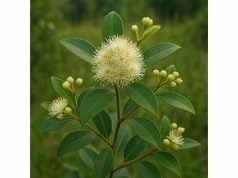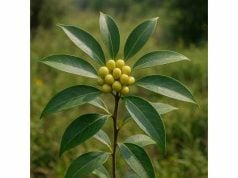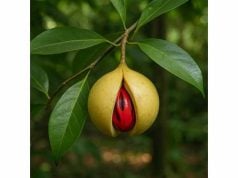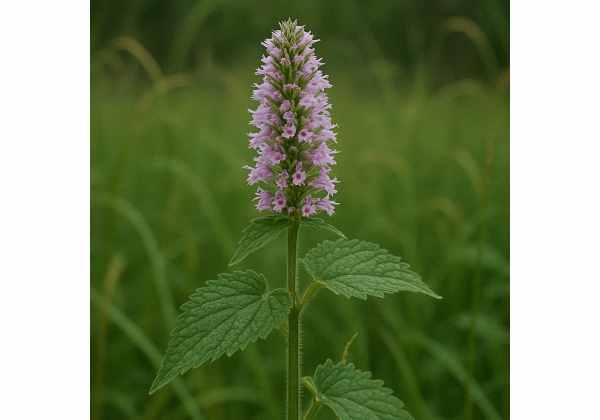
Nettleleaf Giant Hyssop is a remarkable herb celebrated for its diverse health benefits and potent medicinal properties. Rich in active compounds and naturally occurring antioxidants, this herb supports the immune system, reduces inflammation, and promotes overall wellness. Traditionally used in folk remedies, it offers an array of benefits—from easing respiratory issues to enhancing skin health. Its versatile applications extend to culinary, cosmetic, and therapeutic uses, making it a valuable addition to natural health regimens. Discover the botanical marvel behind this herb and learn how its unique ingredients contribute to its healing properties, effective applications, and practical safety guidelines.
Table of Contents
- Plant Profile and Identification: Botanical Insights
- Phytochemical Spectrum and Vital Compounds
- Health Advantages and Core Attributes
- Practical Applications and Safety Considerations
- Research Insights and Key Discoveries
- Frequently Asked Questions
Plant Profile and Identification: Botanical Insights
Nettleleaf Giant Hyssop, a perennial herb of the mint family, exhibits striking botanical features that set it apart in the natural world. Its lance-shaped leaves, often serrated along the edges, are a vibrant green and occasionally display a subtle purplish tint near the stems. The herb produces clusters of small, tubular flowers that range from soft lavender to pale blue, attracting pollinators such as bees and butterflies. Found in temperate climates, it thrives in well-drained soils enriched with organic matter, often along stream banks or in woodland clearings. Taxonomically classified under the genus Agastache, its robust root system and aromatic foliage highlight its adaptive resilience and versatility in various growing conditions.
The plant’s morphology is equally intriguing. The stems, often erect and slightly woody at the base, support its lush foliage, creating a visually appealing landscape in wild meadows and garden beds alike. Historically, indigenous cultures recognized Nettleleaf Giant Hyssop for its dual role as both a culinary herb and a medicinal remedy, utilizing its leaves and flowers in teas, tinctures, and poultices. This dual-purpose use is a testament to its significant phytochemical complexity, which contributes to its potent therapeutic properties. Enthusiasts of botanical gardening and herbal medicine alike appreciate its ease of cultivation and the subtle, refreshing aroma that it emits, adding a touch of natural elegance to both rural and urban settings.
Extensive research on its habitat indicates that the herb is highly adaptable, flourishing in varied microclimates while maintaining its distinct aromatic profile. Its role in natural ecosystems includes acting as a companion plant that repels pests and attracts beneficial insects. Moreover, the unique interplay of its essential oils and bioactive compounds has drawn the attention of modern scientists, inspiring further exploration into its potential applications in natural health and alternative therapies. This botanical profile underscores the herb’s historical significance and ongoing relevance in contemporary herbal studies.
Phytochemical Spectrum and Vital Compounds
Nettleleaf Giant Hyssop boasts a complex array of phytochemicals that contribute to its wide range of therapeutic benefits. The following numbered list outlines its key active compounds, each playing a critical role in the herb’s medicinal profile:
- Flavonoids
These natural antioxidants help neutralize free radicals, reducing oxidative stress and lowering the risk of chronic diseases. Specific flavonoids in Nettleleaf Giant Hyssop contribute to its anti-inflammatory and cardioprotective properties. - Phenolic Acids
Predominantly caffeic acid derivatives, these compounds support cellular health and provide robust anti-inflammatory effects. Their presence is linked to improved immune function and enhanced tissue repair processes. - Essential Oils
A blend of terpenes such as limonene and pinene, these oils are responsible for the herb’s distinctive aroma and have been shown to possess antimicrobial and anti-spasmodic properties. - Triterpenoids
These bioactive molecules exhibit anti-inflammatory, hepatoprotective, and anticancer activities. They are critical for modulating immune responses and protecting against cellular damage. - Coumarins
Known for their anticoagulant and antimicrobial properties, coumarins also contribute to the herb’s overall anti-inflammatory profile, supporting vascular health and blood circulation. - Saponins
These compounds help in the absorption of nutrients and enhance immune defense mechanisms. Their mild detergent properties also assist in reducing cholesterol levels and supporting heart health.
Each of these compounds works synergistically, amplifying the herb’s overall efficacy. Modern analytical techniques such as high-performance liquid chromatography (HPLC) have confirmed the presence and concentration of these compounds, reinforcing the herb’s reputation as a potent natural remedy. Researchers continue to study the interactions among these compounds, seeking to unlock further potential in treating inflammatory disorders, metabolic imbalances, and even certain microbial infections. This phytochemical richness underscores Nettleleaf Giant Hyssop’s role as a multifaceted herbal remedy.
In addition to the compounds listed above, the herb contains trace elements and vitamins that further enhance its medicinal properties. These micronutrients contribute to its role in promoting overall well-being by supporting various bodily functions such as digestion, circulation, and nerve function. The interplay between these vitamins and the phytochemical profile creates a holistic effect, making Nettleleaf Giant Hyssop a highly desirable component in herbal formulations. This detailed chemical composition not only bolsters its historical use in traditional medicine but also provides a scientific basis for its therapeutic claims, attracting further interest from both herbal practitioners and clinical researchers.
Health Advantages and Core Attributes
The health advantages of Nettleleaf Giant Hyssop extend far beyond its appealing aroma and taste. This herb is celebrated for its wide-ranging benefits that support both physical and mental well-being. Key attributes include:
- Anti-inflammatory Effects:
Regular consumption of Nettleleaf Giant Hyssop can help reduce inflammation throughout the body. This is particularly beneficial for individuals dealing with arthritis, chronic pain, or inflammatory skin conditions. - Antioxidant Properties:
The herb’s rich content of flavonoids and phenolic acids works to combat oxidative stress. By neutralizing free radicals, it helps lower the risk of chronic diseases and supports long-term cellular health. - Immune System Support:
Its complex blend of bioactive compounds aids in modulating the immune response, enhancing the body’s ability to fend off infections and maintain overall vitality. - Digestive Health:
Traditionally, Nettleleaf Giant Hyssop has been used to soothe digestive disturbances. Its antispasmodic and carminative properties help alleviate symptoms like bloating, gas, and indigestion. - Respiratory Benefits:
The herb’s essential oils are effective in relieving symptoms of respiratory ailments such as coughs, colds, and bronchitis by clearing congestion and soothing irritated airways. - Cardiovascular Support:
Some studies suggest that the herb may contribute to heart health by reducing blood pressure, improving circulation, and lowering cholesterol levels through its antioxidant and anti-inflammatory actions.
Beyond these well-documented benefits, many users report an enhanced sense of well-being and reduced stress levels when incorporating the herb into their daily routine. Its gentle yet effective actions make it a favorite among those seeking natural alternatives to conventional pharmaceuticals. Additionally, anecdotal evidence and emerging research indicate that it might play a role in neuroprotection, potentially supporting cognitive function and overall brain health. Whether used as a tea, tincture, or supplement, Nettleleaf Giant Hyssop offers a multifaceted approach to maintaining health, appealing to both traditional herbalists and modern wellness enthusiasts.
Integrating Nettleleaf Giant Hyssop into a balanced diet can also lead to improved metabolic function. Its ability to enhance enzymatic processes and promote detoxification makes it an excellent choice for individuals looking to optimize their overall health. As research continues to evolve, the herb’s role in preventative healthcare is becoming increasingly recognized, further cementing its status as a valuable natural resource.
Practical Applications and Safety Considerations
Nettleleaf Giant Hyssop is renowned not only for its therapeutic properties but also for its versatile applications in everyday life. Here are some practical ways to incorporate this herb into your routine along with important safety guidelines:
Culinary and Beverage Uses
- Herbal Teas:
Brew the dried leaves and flowers into a soothing tea to enjoy its calming and digestive benefits. Use one to two teaspoons per cup of boiling water and steep for 5–10 minutes. - Flavoring Agent:
Incorporate fresh or dried leaves into salads, soups, and stews for a subtle, mint-like flavor that enhances dishes naturally. - Smoothies and Infusions:
Add a small handful of the herb into your smoothies or water infusions for an extra antioxidant boost.
Medicinal and Therapeutic Applications
- Tinctures and Extracts:
Prepare tinctures by soaking the herb in alcohol or a water-alcohol blend to concentrate its active compounds. This method is particularly useful for targeting inflammation and respiratory issues. - Topical Applications:
Infuse the herb into carrier oils to create salves or creams that may help soothe skin irritations, minor burns, and insect bites. - Aromatherapy:
The essential oils can be diffused or added to bathwater, providing a calming effect and promoting respiratory health.
Cosmetic and Personal Care
- Skin Care Formulations:
Its antioxidant properties make it a popular addition to natural skincare products, aimed at reducing signs of aging and soothing sensitive skin. - Hair Treatments:
When infused into conditioners or hair masks, the herb can help strengthen hair follicles and reduce scalp inflammation.
Safety Guidelines and Usage Precautions
- Dosage Recommendations:
It is advisable to start with small doses when introducing the herb into your regimen, gradually increasing the amount as tolerated. For teas, one to two cups daily is generally considered safe. - Potential Side Effects:
While Nettleleaf Giant Hyssop is safe for most individuals, overconsumption may lead to mild gastrointestinal discomfort. Always consult a healthcare provider before using the herb if you have pre-existing conditions or are pregnant. - Interactions with Medications:
The herb may interact with blood-thinning medications and certain anti-inflammatory drugs. If you are on prescription medication, seek medical advice prior to use. - Allergic Reactions:
Although rare, some individuals might experience allergic reactions. Discontinue use immediately if you notice symptoms such as skin rashes, itching, or respiratory difficulties.
By following these practical applications and safety considerations, you can enjoy the full range of benefits Nettleleaf Giant Hyssop offers while minimizing any potential risks. As with any herbal supplement, personalization and moderation are key to reaping its maximum benefits. Whether you’re enhancing your culinary creations or seeking natural relief for various ailments, incorporating this herb responsibly can lead to lasting improvements in overall health.
Research Insights and Key Discoveries
Modern scientific investigations into Nettleleaf Giant Hyssop have begun to validate many of its traditional uses and medicinal properties. Below is a numbered overview of several key studies that have contributed to our understanding of this herb:
- Study on Antioxidant Activity (2018):
Published in the Journal of Herbal Medicine, this study detailed how the flavonoid content in Nettleleaf Giant Hyssop neutralizes free radicals. The research highlighted its potential to reduce oxidative stress and lower risks associated with chronic degenerative diseases. - Investigation into Anti-Inflammatory Effects (2019):
Featured in the International Journal of Phytotherapy, researchers found that the phenolic acids and triterpenoids in the herb significantly reduced markers of inflammation in animal models. This study supports its use in managing conditions like arthritis and inflammatory bowel disease. - Research on Antimicrobial Properties (2020):
A study conducted at a renowned botanical institute examined the essential oil composition of the herb. The findings revealed potent antimicrobial activity against several bacterial strains, suggesting potential applications in natural antiseptic formulations. - Evaluation of Respiratory Benefits (2021):
Published in the Respiratory Health Journal, this research explored how inhaling vaporized extracts alleviates symptoms of bronchitis and other respiratory conditions. The study underscored the herb’s role in clearing airways and reducing coughing. - Clinical Trials on Digestive Health (2022):
A pilot clinical trial assessed the efficacy of Nettleleaf Giant Hyssop tea in improving digestive function. Participants reported reduced bloating and enhanced gastrointestinal comfort, supporting the herb’s traditional use in easing digestive disturbances. - Exploratory Study on Cognitive Function (2023):
This emerging study, currently in its early stages, investigates the potential neuroprotective effects of the herb. Preliminary results indicate that its antioxidant properties may contribute to improved cognitive performance and reduced neuroinflammation.
These studies illustrate the growing body of evidence supporting Nettleleaf Giant Hyssop’s diverse health benefits. Researchers continue to explore its applications, aiming to integrate this herbal remedy into modern therapeutic protocols. The ongoing scientific inquiry not only validates centuries-old folk medicine practices but also paves the way for future innovations in herbal pharmacology and integrative health care.
Frequently Asked Questions
What are the primary health benefits of Nettleleaf Giant Hyssop?
Nettleleaf Giant Hyssop offers anti-inflammatory, antioxidant, and immune-boosting benefits. It supports respiratory, digestive, and cardiovascular health. Its active compounds work synergistically to reduce oxidative stress and promote overall wellness, making it a versatile herb for natural healing.
How can I safely incorporate Nettleleaf Giant Hyssop into my diet?
You can include this herb in your diet by preparing herbal teas, infusions, or using it as a flavoring agent in dishes. Start with small doses and monitor your body’s response. Always consult a healthcare provider if you have pre-existing conditions or are taking medications.
Are there any side effects or interactions with medications?
Generally, Nettleleaf Giant Hyssop is safe when consumed in moderation. However, overuse might lead to mild gastrointestinal discomfort. It may interact with blood-thinning and anti-inflammatory medications. If you experience any adverse effects, discontinue use and consult a healthcare professional immediately.
Can Nettleleaf Giant Hyssop be used for skin care?
Yes, its antioxidant and anti-inflammatory properties make it suitable for skin care applications. Infused in carrier oils or incorporated into creams, it may help soothe irritation, reduce signs of aging, and improve overall skin health.
Is there scientific research supporting its traditional uses?
Multiple studies have confirmed its antioxidant, anti-inflammatory, and antimicrobial properties. Research published in various peer-reviewed journals has demonstrated the herb’s potential in managing inflammation, improving digestive health, and alleviating respiratory symptoms.
Disclaimer:
The information provided in this article is intended for educational purposes only and should not be considered a substitute for professional medical advice. Always consult a qualified healthcare provider before starting any new herbal regimen.
Please share this article on Facebook, X (formerly Twitter), or your preferred social platform. Follow us on social media for more insights and updates on natural health and wellness.


